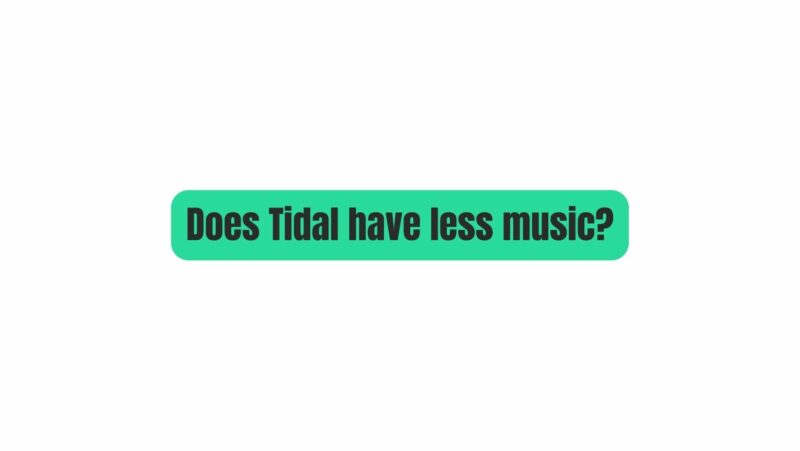Tidal, a music streaming platform known for its emphasis on high-fidelity audio quality and artist-driven initiatives, has often been subject to scrutiny regarding the size and diversity of its music catalog. Critics and skeptics have questioned whether Tidal offers as extensive a library as its competitors like Spotify, Apple Music, and Amazon Music. In this article, we will dive deep into the myth that Tidal has less music and explore the realities of its music catalog, shedding light on the platform’s content offerings and how they stack up against the competition.
- Tidal’s Unique Selling Points
Before delving into the discussion about Tidal’s music catalog, it’s essential to understand what sets the platform apart from its competitors:
- High-Fidelity Audio: Tidal distinguishes itself by offering high-fidelity audio quality, catering to audiophiles and music enthusiasts who seek the best possible sound experience.
- Exclusive Content: Tidal has secured exclusive releases and content partnerships with various artists, providing subscribers with access to exclusive tracks, albums, and even early releases.
- Artist Ownership and Fair Compensation: Tidal has emphasized its commitment to fair compensation for artists and has garnered support from musicians who appreciate this ethos.
- Tidal’s Music Catalog Size
Contrary to the belief that Tidal offers a limited music catalog, the platform boasts a vast and diverse library of songs and albums. Tidal’s catalog includes millions of tracks, spanning various genres and regions, making it competitive in terms of sheer quantity.
- Comparison with Competitors
To assess whether Tidal truly has less music compared to its rivals, we must consider the size of its catalog in comparison to other leading music streaming platforms:
- Spotify: Spotify is renowned for its extensive music catalog, with over 70 million tracks. It is often considered the industry leader in terms of sheer quantity.
- Apple Music: Apple Music, with its integration into the Apple ecosystem, offers a catalog of around 75 million songs, making it a formidable competitor in terms of content diversity.
- Amazon Music: Amazon Music provides access to a vast library of music, with a catalog of over 75 million tracks, rivaling the largest players in the industry.
- Tidal: While Tidal’s exact catalog size may fluctuate over time due to licensing agreements and exclusives, it offers millions of songs, placing it in a competitive position relative to the major streaming platforms.
- Content Diversity and Exclusives
What further sets Tidal apart is its focus on content diversity and exclusivity. While the platform may not have as many tracks as Spotify or Apple Music, it prides itself on offering exclusive content and early releases from renowned artists. This approach provides a unique value proposition for subscribers who seek access to exclusive tracks and albums.
- Quality Over Quantity
Tidal’s emphasis on high-fidelity audio quality also plays a role in the perception of its catalog size. The platform prioritizes audio quality, which means that some tracks may be offered in higher-quality formats, contributing to a perception that it has a smaller library when, in fact, it offers the same music, albeit with better audio fidelity.
- Local and Niche Content
Another aspect to consider is Tidal’s commitment to showcasing local and niche content. The platform actively promotes independent artists and regional music scenes, which may not be as prevalent on larger streaming services. This focus on diverse content can be a significant draw for subscribers interested in exploring a wide range of music.
- Licensing Agreements and Availability
The size of a streaming platform’s catalog can also be influenced by licensing agreements and regional availability. Some tracks or albums may be region-specific due to licensing restrictions, affecting the perceived size of a catalog in certain areas.
- User Experience and Music Discovery
Ultimately, the perception of a platform’s music catalog size also depends on the user experience and the effectiveness of its music discovery features. Tidal’s user interface and recommendation algorithms may influence how users perceive the breadth of its content.
- Conclusion
Tidal’s music catalog is a subject of debate, but the notion that it has significantly less music is a misconception. While it may not have the sheer quantity of tracks as some of its competitors, Tidal’s catalog is still vast and diverse, offering millions of songs across various genres and regions. Moreover, the platform’s focus on high-fidelity audio quality, exclusive content, and fair artist compensation makes it an attractive option for subscribers who prioritize quality over quantity.
Ultimately, the size of a music streaming platform’s catalog is just one aspect of the overall user experience. Tidal’s unique features, exclusive content, and commitment to artists set it apart in a crowded industry. Whether it’s the right platform for an individual listener depends on their specific preferences and priorities, but the notion that Tidal has less music is a myth that deserves to be dispelled.


